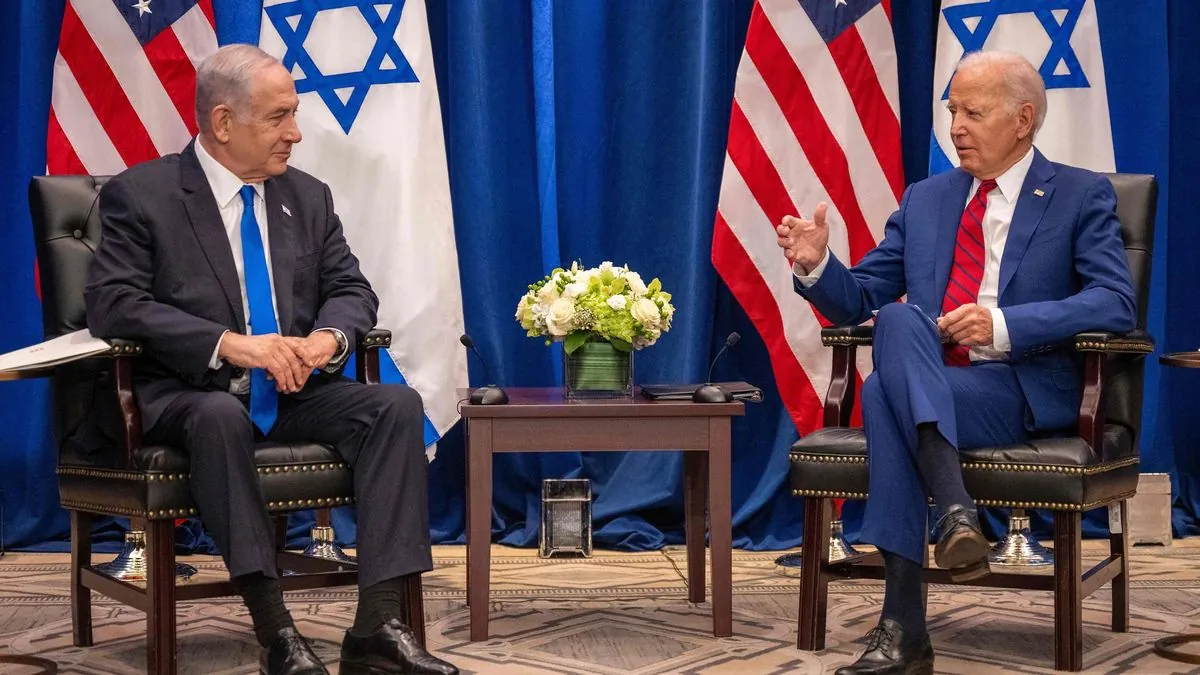Biden's Diplomatic Tightrope: Navigating the Israel-Gaza Conflict
President Biden faced challenges balancing support for Israel with humanitarian concerns in Gaza, while struggling to prevent regional escalation. Diplomatic efforts yielded limited success as the conflict expanded beyond initial boundaries.

In the year following the October 7, 2023 Hamas attack on Israel, President Joe Biden faced a complex diplomatic challenge. Balancing unwavering support for Israel with urgent humanitarian concerns in Gaza, Biden's administration navigated a treacherous path that tested U.S. influence in the Middle East.
The conflict began when Hamas militants launched a devastating assault on Israel, killing approximately 1,200 people and taking 250 hostages. Israel's response was swift and severe, launching a massive military campaign in Gaza. Biden immediately expressed solidarity with Israel, dispatching Secretary of State Antony Blinken and Defense Secretary Lloyd Austin to Tel Aviv within days.
However, as the Palestinian death toll mounted and a humanitarian crisis unfolded in Gaza, the U.S. found itself in an increasingly difficult position. Biden urged Israeli Prime Minister Benjamin Netanyahu to adhere to international norms and protect civilians, but these pleas often went unheeded. The Gaza Strip, a mere 141 square miles in area, became a battleground where the lives of over a million civilians hung in the balance.
U.S. efforts to increase humanitarian aid to Gaza faced numerous obstacles. Despite American pressure, Israel frequently blocked or delayed aid deliveries, exacerbating the crisis. The Biden administration took unprecedented steps, including airdrops and the construction of a temporary pier, to deliver assistance directly. However, these measures proved insufficient to address the scale of the humanitarian disaster.

The conflict's impact extended far beyond Gaza's borders. Iran's direct missile attack on Israel on April 13, 2024, marked a significant escalation. While U.S. and Israeli forces successfully intercepted most of the projectiles, the incident highlighted the risk of a wider regional war. Biden's calls for restraint were often ignored, as Israel conducted strikes in Syria, Lebanon, and Iran itself.
Negotiations for ceasefires and hostage releases proved challenging. Despite intensive U.S.-led diplomatic efforts, agreements remained elusive. The situation was further complicated by Netanyahu's domestic political considerations and the demands of his right-wing coalition partners.
As Israel prepared for a major offensive in Rafah, southern Gaza, in May 2024, tensions between Washington and Tel Aviv reached a new high. The Biden administration warned that an operation risking massive civilian casualties could not be supported, but Israel proceeded nonetheless. This decision strained the U.S.-Israel relationship and raised questions about America's influence over its closest Middle East ally.
The conflict's expansion to involve Hezbollah in Lebanon further tested U.S. diplomacy. Israeli strikes against Hezbollah targets, including the assassination of a senior leader in Beirut, threatened to ignite a wider war. The Biden administration found itself scrambling to prevent further escalation while maintaining its commitment to Israel's security.
Throughout the crisis, Biden faced criticism both at home and abroad. Protesters accused him of complicity in Israeli actions, while others argued he wasn't supportive enough of Israel. The conflict divided the Democratic Party and complicated Biden's foreign policy agenda.
As the war entered its second year, the prospects for a lasting peace remained dim. The Gaza Strip lay in ruins, with over 40,000 Palestinians killed and much of its infrastructure destroyed. Hamas, while weakened, continued to operate. The regional situation remained volatile, with Iran and its proxies poised for further confrontation.
In his final address to the United Nations General Assembly as president in September 2024, Biden appealed for calm and de-escalation. However, events on the ground continued to outpace diplomatic efforts, leaving a legacy of unresolved conflict and humanitarian suffering.
"We are at another inflection point. The world must come together to address this crisis and prevent further escalation that threatens global stability."
The Israel-Gaza conflict of 2023-2024 exposed the limits of U.S. influence in the Middle East and the challenges of balancing competing priorities in a volatile region. As Biden's presidency drew to a close, the elusive goal of a comprehensive peace remained as distant as ever.


































